#19thcenturypolitics
TheLincoln Financial Foundation Collection holds the Richard W. Thompson Manuscript Collection, a large collection of letters written to Indiana politician Richard Wigginton Thompson during the course of his career from 1834 to 1897. These include letters from other state and national politicians and provide some interesting private glimpses of 19th-century politics, especially the “backstage” activities surrounding the presidential campaigns of 1860 and 1864.
Thompson (1809-1900) was influential in the Indiana Whig Party from the 1830s through the 1850s, serving two terms in the Indiana House and one in the Indiana Senate before serving two terms in the United States House of Representatives from 1841 to 1843 and 1847 to 1849. As the national debate over slavery heated up during the 1850s and the Whig Party fragmented, Thompson found the new Republican Party to be too radical on the slavery issue. Nonetheless, he remained in contact with former Whigs who had joined the Republicans and who kept him informed of the party’s 1860 campaign—men like John A. Norton of Pennsylvania and Abraham Lincoln of Illinois.
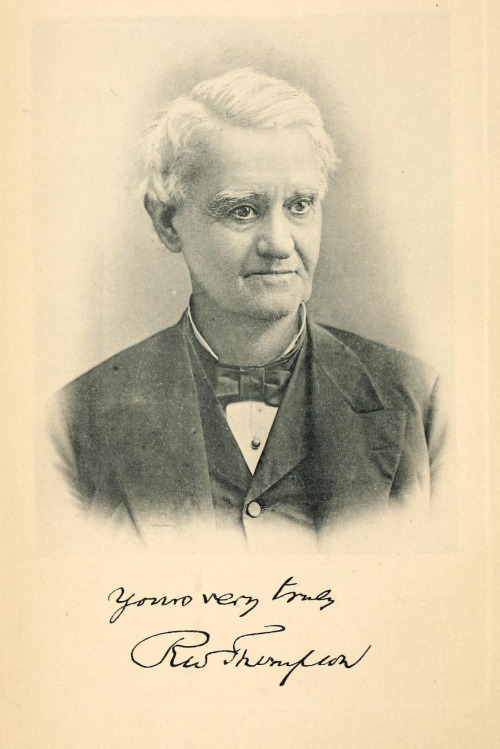
Norton wrote to Thompson in March 1860 describing the unsuccessful machinations of Simon Cameron, a fellow Pennsylvania Republican, at the state Republican Party convention. Cameron had attempted to build support for his nomination to the presidential ticket at the party’s upcoming national convention in June 1860.
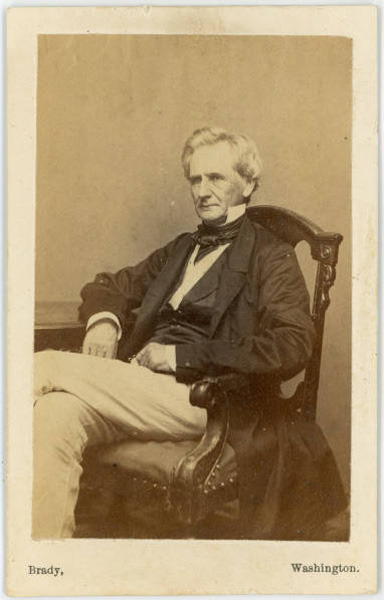
Norton did not think highly of Cameron, to say the least. In a letter written on March 26th, he informed Thompson, “That slimy reptile, Simon Cameron has been playing the devil with the politics of our state. He had a powerful majority in the late 22 July state convention, but the minority worked their efforts to thwart him … Simon Cameron can now return to Washington to represent, or more properly speaking misrepresent our state, in the U S senate … a gentleman of our city who went to Harrisburg to watch the proceeding of the late convention opined me that some of the most respectable people in the place did not hesitate to declare boldly & openly, that if Cameron had his deserts, he would be serving out a sentence in the penitentiary instead on serving in the US Senate.”
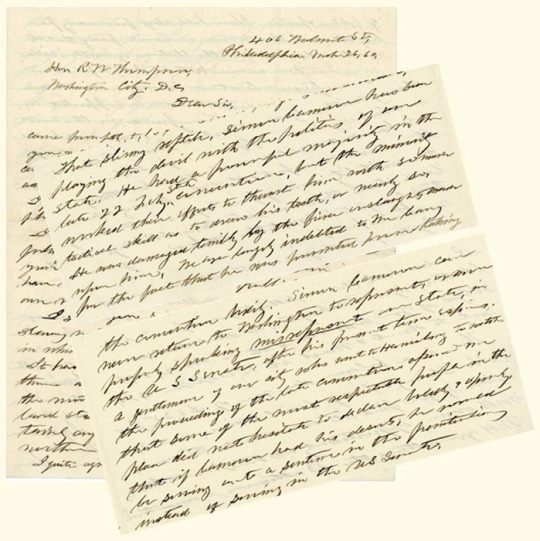
Although he had known Lincoln when they served together in Congress, Thompson’s concerns about the Republicans’ anti-slavery stand led him to support Constitutional Union Party candidate John Bell in the early months of the 1860 presidential campaign. Two letters written to Thompson by Lincoln during the summer of 1860 reveal the Republican candidate’s attempt to gain Thompson’s support and undermine the organizing efforts of the Constitutional Union Party.
On June 18th, Lincoln wrote this brief letter to Thompson, thanking him for a letter Thompson had sent in which he had noted that he might “possibly” vote for Lincoln if the Constitutional Union candidates were not on the Indiana ballot. Lincoln urged Thompson to “converse freely” with Maryland Congressman Henry Winter Davis, who had supported the Constitutional Union Party but who had strong anti-slavery views and had voted with the Republicans in Congress. Lincoln apparently hoped Davis would nudge Thompson toward supporting the Republican ticket and short circuiting attempts to run a Constitutional Union ticket in every state.
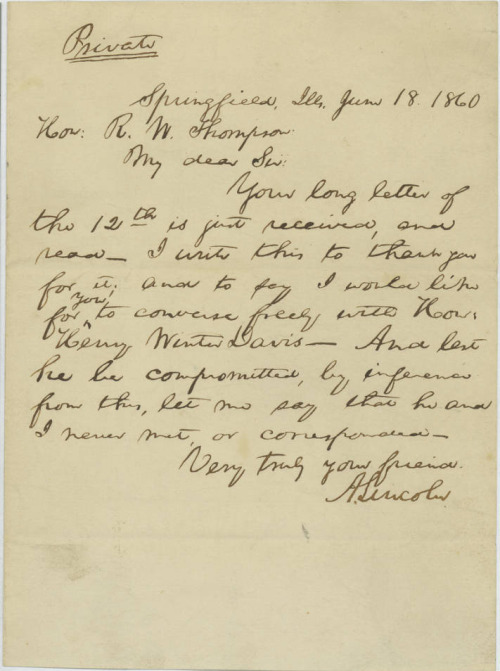
Thenon July 10th, Lincoln wrote to Thompson again, asking Thompson to “watch Chicago a little,” possibly to prevent a Constitutional Union Party ticket in Illinois, and to contact Lincoln supporter John Wilson to “fix the matter.” This letter is not only marked “Private”—Thompson is instructed to “Burn this,” which obviously he did not do.
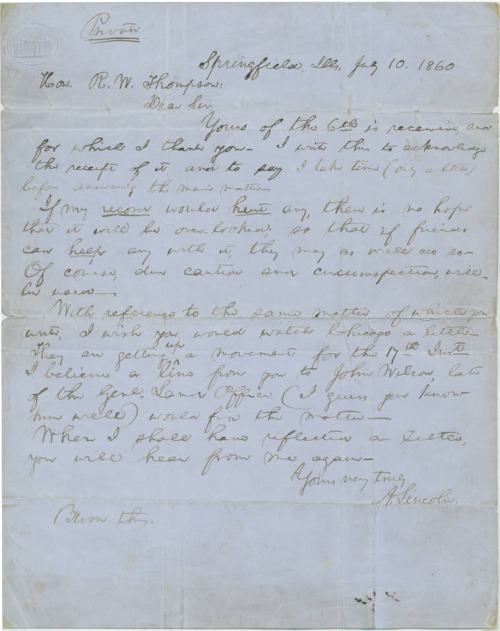
As it happened, John Wilson and Thompson had already exchanged letters on the matter. In a “Private” letter of June 16th, Wilson argued against running a Constitutional Union Party ticket in Illinois. He wrote, “Here the question is reduced down to a choice between Douglass and Lincoln,” and nationally Bell “has not the slightest chance of an election.” If the Democratic candidate were to be elected, the consequences would be dire—the result would be “a state of corrupt despotism, licentious agrarianism, or civil war, and possibly all combined, & in comparison to which the despotisms of Russia or Turkey, would be a perfect Paradise.” Wilson concluded, “I have determined to do all in my power, in this State and elsewhere, to secure the election of Lincoln….[and] do all in my power to prevent the running of a Union Ticket.” He urges Thompson abandon the Constitutional Union Party and support Lincoln as well.
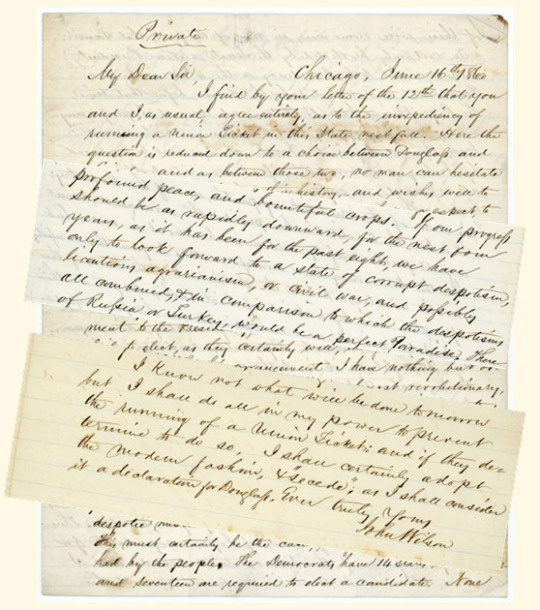
Lincoln, Davis, and Wilson were successful in convincing Thompson to join the Republicans. In August of 1860, when it became clear that Constitutional Union Party candidate Bell could not win the election, Thompson declared his support for Lincoln.
Letters to Thompson also reveal some of the “backstage” activity during the 1864 presidential campaign. In the months leading up to the 1864 Republican National Convention, Secretary of the Interior John P. Usher kept Thompson informed about the scandal surrounding the Pomeroy Circular, a secret document shared among Republicans who wanted to replace Lincoln with Secretary of the Treasury Salmon P. Chase as the party’s presidential nominee.

On February 17th Usher wrote, “A secret circular has just been issued signed by Pomeroy Chairman for Chase for President. Mr C must have knowledge of & approved it. It contains reflections upon the President of such an offensive character that there will have to be explanations and will I think cause a rupture in the cabinet, There is such caballing & plotting going on here.”

Not surprisingly, the circular did not remain secret, and it did not build support for Chase. Instead, it made its way into Lincoln’s possession, was published in the newspapers, and caused a scandal within the party. And on February 25th, after publication of the circular, Usher wrote, “I suppose you have seen the Pomeroy Circular and have been amazed that Mr Chase should have allowed such a paper to go to the public. It is a most indecent thing and how a man of strict honour can hold his position as adviser of the President after stating that he disagrees with him on his policy is more than I can tell.” But, he concluded, “I think now that the worst is over. The Pomeroy Circular was so badly conceived and so badly worded that Chase and his friends will have to repudiate it in doing which they substantially give up their cause—Politicians will soon see that the people are for Lincoln and they will make haste to be in that way too.” Usher was correct. When the Republicans held their nominating convention in June, Lincoln was easily nominated for a second term.
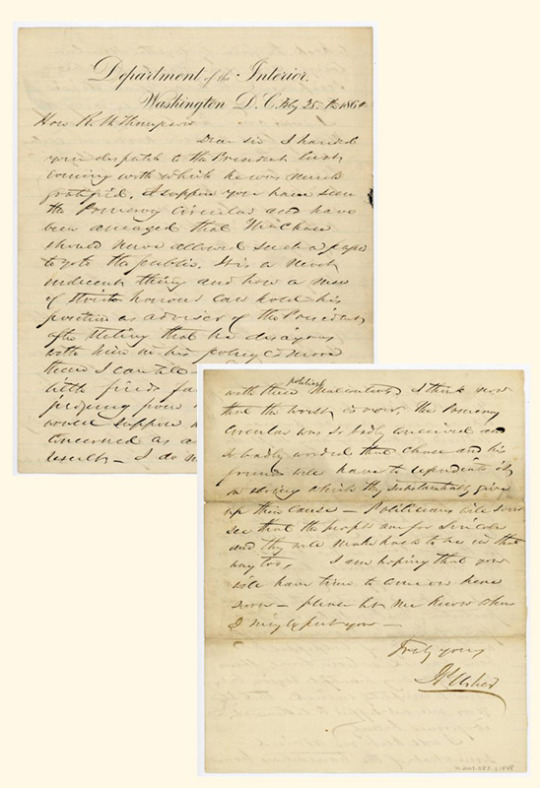
You can explore hundreds of additional documents from the Richard W. Thompson Manuscript Collection here.
